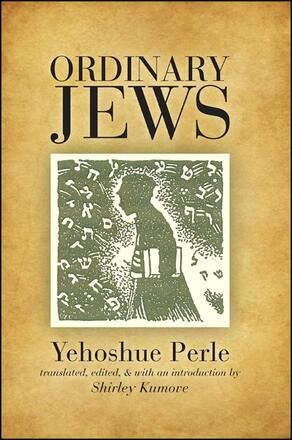
Ordinary Jews
Alternative formats available from:
A new translation of a modern Yiddish masterpiece.
Description
Since its original publication in 1935, Ordinary Jews has come to be regarded as one of the masterpieces of Yiddish literature. In his portrayal of the lives of ordinary Polish Jews in a small provincial city at the end of the nineteenth century, Yehoshuah Perle offers a glimpse at a way of life that was already changing by the time of the novel's publication and would soon be brutally exterminated in the Holocaust. Through the eyes of the novel's young protagonist, Mendl Shonash, we are introduced to an intricate society of housewives, beggars, tailors, doctors, maidservants, tavern keepers, teachers, gravediggers, rabbinical students, and a whole range of people living close to the bottom of the social scale, as well as the various social hierarchies, shady dealings, pretensions, grotesqueries, and superstitions that color and order their world. Like a star whose light is visible to us light years after its creation, Ordinary Jews provides a glimpse into a particular culture and unique way of life that might otherwise be lost to history.
Yehoshue Perle (1888–1943) was born in Radom, Poland, and later moved to Warsaw, where he became active in Yiddish literary circles. In addition to Ordinary Jews (Yidn fun a gants yor), he also published poetry, short stories, literary sketches, criticism, and articles for Yiddish newspapers. One of Poland's most popular, prolific, and controversial Yiddish writers, he died in Auschwitz-Birkenau in 1943. Shirley Kumove is a writer and translator on the subject of Yiddish—particularly its folklore and literature. She is the translator of several books, including, Drunk from the Bitter Truth: The Poems of Anna Margolin, also published by SUNY Press, which received the 2007 Award in Yiddish Literature and Translation from Yiddish presented by the Helen and Stan Vine Canadian Jewish Book Awards. She is also the author of More Words, More Arrows: A Further Collection of Yiddish Folk Sayings. She was born, educated, and makes her home in Toronto.
Reviews
"Excelsior Editions of the State University of New York Press has performed a valuable service in publishing Ordinary Jews, and Kumove provides a fine introduction and notes that will be illuminating to students and scholars alike … an important and timely publication on the basis of its comparative value in Jewish studies, which is decidedly international. " — H-Net Reviews (H-German)
"Perle's rich and vivid picture brings to life the smells and the grit, the mud and the homely meals, the curses and the struggle to piece a living together … [he] fulfills the promise of his title, Ordinary Jews, and gives today's readers entry to a world that is now dust. " — Jewish Book World
"Shirley Kumove is the ideal translator who is aware of the problematics of translation (particularly from Yiddish), is sensitive to both the original and target languages, and is familiar with the vanished culture conveyed in this novel. This translation is an important contribution to our knowledge of a culture that has disappeared and the literature that is unavailable to most English readers. " ― Barbara Harshav, translator of Meir Shalev's novel Four Meals
"Shirley Kumove has magnificently preserved the flavor of Perle's highly idiomatic autobiographical Yiddish masterpiece in her flowing translation as well as provided a helpful scholarly apparatus for those who wish to delve deeper into the ethnographic and historical nuances of Polish Jewry. She has done a profound service not only to those who are interested in the complex dynamics of Jewish life and inter-ethnic relations in the Polish provinces of the early twentieth-century Russian empire, has also made accessible to an English-speaking audience a truly great portrait of humanity. " — Kalman Weiser, author of Jewish People, Yiddish Nation: Noah Prylucki and the Folkists in Poland